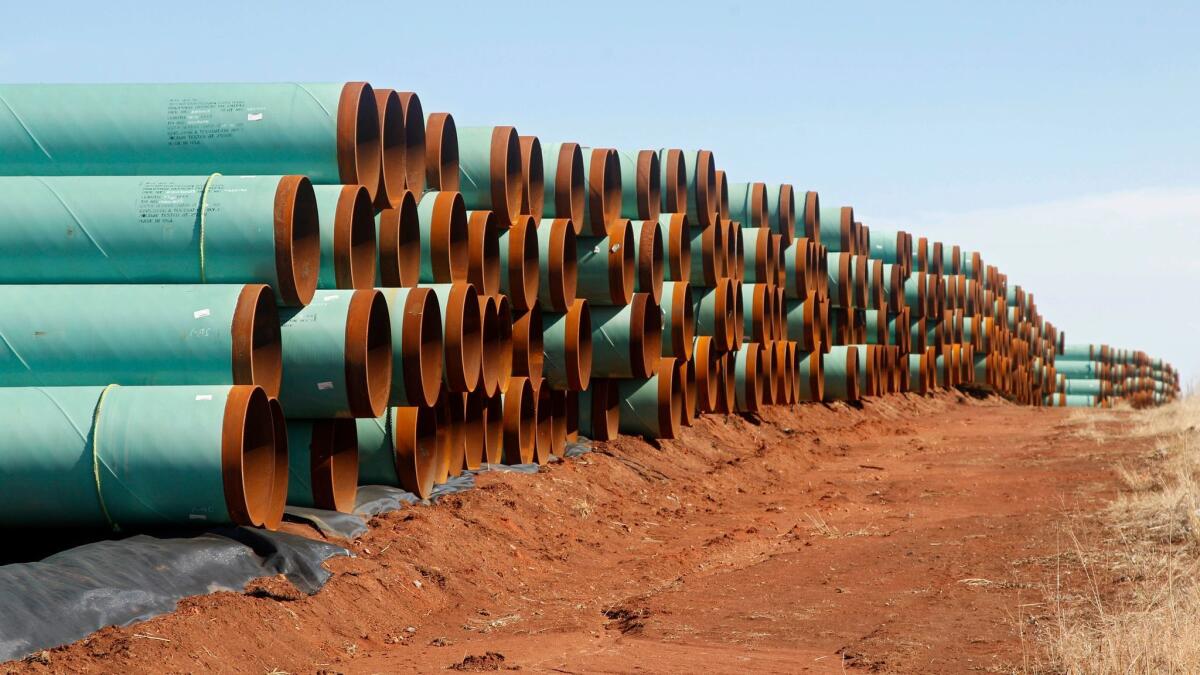Canada keeps signing free trade deals, and few people seem to mind
- Share via
Reporting from Ottawa — One of the few issues on which Hillary Clinton and Donald Trump have agreed is their opposition to the Trans-Pacific Partnership (although Trump disagrees that Clinton opposes it). Their positions reflect the significant skepticism that many Americans have toward free trade.
But step across the northern border, and there’s a very different outlook. Canada has been busily pursuing free-trade agreements under both Conservative and Liberal governments, with minimal opposition.
On Sunday, just days before he celebrates his first year in office as Canada’s prime minister, Justin Trudeau signed a massive economic and trade agreement with the European Union that will give Canada access to a market of more than 500 million people in 28 countries, with a combined GDP of more than $16 trillion.
Trudeau’s Liberal government has also set its sights on trade deals with China and India, and supports the Trans-Pacific Partnership, or TPP, which Stephen Harper’s Conservative government signed last October before losing the federal election.
“Canadians recognize that it’s a benefit to the country to have large markets because our domestic market is not large enough,” said Toronto-based economist Sherry Cooper, who teaches financial economics at McMaster University in Hamilton.
As an affluent, highly developed country, Canada has a great deal in common with the United States — much more than the U.S. has in common with its southern neighbor, Mexico.
But while 77% of Canada’s trade is with the U.S., the decreasing need for Canadian oil and automobile production south of the border has required the Canadian government to aggressively look farther afield for opportunities, Cooper said.

Unlike Germany, where hundreds of thousands of people took to the streets in September to protest separate European trade deals with Canada and the U.S., Canada has had no large public demonstrations against free trade.
It was also not a major issue in last year’s Canadian general election, as it was nearly 30 years ago, when then-Prime Minister Brian Mulroney called an election to break a parliamentary logjam over the Canada-U.S. Free Trade Agreement, which he had negotiated with President Reagan.
Mulroney’s Tories were reelected, the trade agreement was signed, and Mulroney subsequently negotiated the North American Free Trade Agreement, or NAFTA.
Later, under Harper’s watch, Canada expanded its trade reach by finalizing agreements with a diverse array of countries, including South Korea, Colombia and Jordan, and launching negotiations for the pact with the EU, which Trudeau has now concluded.
“Canada is a trading nation,” said Michael Hart, a retired professor of international trade policy at Ottawa-based Carleton University, who helped negotiate the Canada-U.S. Free Trade Agreement and was involved in the NAFTA talks.
He noted that although the Canada-EU deal is significant, 45% of Canada’s trade with Europe is with the United Kingdom, whose forthcoming exit from the union will “carve out” some of that benefit.
If the Toronto Blue Jays made it to the World Series playoffs, we’d be far more transfixed with that.
— Shachi Kurl, executive director of the Angus Reid Institute
Hart said that while there is a “very vocal minority” of trade opponents, including Canadian Green Party Leader Elizabeth May, who believe the Canada-EU deal will favor multinational companies at the expense of Canadian sovereignty, Canadians by and large shrug when their federal government searches for countries with which to buy and sell goods and services.
However, Ottawa-based pollster Frank Graves has noticed a shift in Canadian attitudes toward free trade in surveys his firm, EKOS Research Associates Inc., has conducted over the last decade.
In 2005, Canadian support for NAFTA was at 80%, but dropped to 70% 10 years later. Support for NAFTA was never that high in the United States.
“Canadians remain largely supportive of trade liberalization, but they have had a more guarded, less positive view in recent years,” said Graves.
He believes the shift is partly the result of some Canadians feeling hopeless about their future under globalization, and embracing the nativism that is seeing an upsurge around the world, including in some of Trump’s followers and in some Britons who voted for the “Brexit” from the EU.

Between 2005 and 2015, EKOS found a 13 percentage-point increase in the number of Canadians who view foreign investment and ownership of domestic companies as a threat to national sovereignty, and a 22 percentage-point rise in those who felt Canada accepts too many immigrants who are visible minorities.
In its surveys, the Canadian polling firm Nanos Research has found that Canadians view free trade based on a “hierarchy of comfort,” said its president and chief executive officer, Nik Nanos.
“There is an extremely high level of confidence and support for trade with the United States and Europe because Canadians see those two economies as being comparable to Canada’s,” he said.
“But support is not as intense when it comes to trade with China. Canadians are concerned about being able to compete with China in terms of the lower wages they pay their workers,” said Nanos.
Still, when the Vancouver-based public-opinion research firm Angus Reid Institute asked Canadians last year to identify the country’s top foreign priority, more than half chose international trade, far more than chose foreign aid or military preparedness.
“The prime minister signed this huge trade deal with Europe on Sunday, and it will barely rate the blink of an eye by Canadians,” said Shachi Kurl, the institute’s executive director.
“If the Toronto Blue Jays made it to the World Series playoffs, we’d be far more transfixed with that.”
However, Ontario businesswoman Rhonda Barnet sees Canada’s formal entry into a Comprehensive Economic and Trade Agreement with the EU as a huge win.
She and her husband, Don, own Steelworks Design Inc., a Peterborough-based company that employs 30 people, and exports half the machinery and equipment it custom manufactures to the U.S., Mexico and Europe.
“Small companies like ours easily tap out domestic markets,” said Barnet, who was recently appointed the first female chair of the Canadian Manufacturers and Exporters trade-and-industry organization that represents more than 10,000 companies.
“Trade is our biggest opportunity for growth.”
Guly is a special correspondent.
ALSO
Canadian Charles Margrave Taylor wins inaugural Berggruen Prize for Philosophy
Canadian government says it will implement a nationwide carbon tax by 2018
More to Read
Sign up for Essential California
The most important California stories and recommendations in your inbox every morning.
You may occasionally receive promotional content from the Los Angeles Times.










